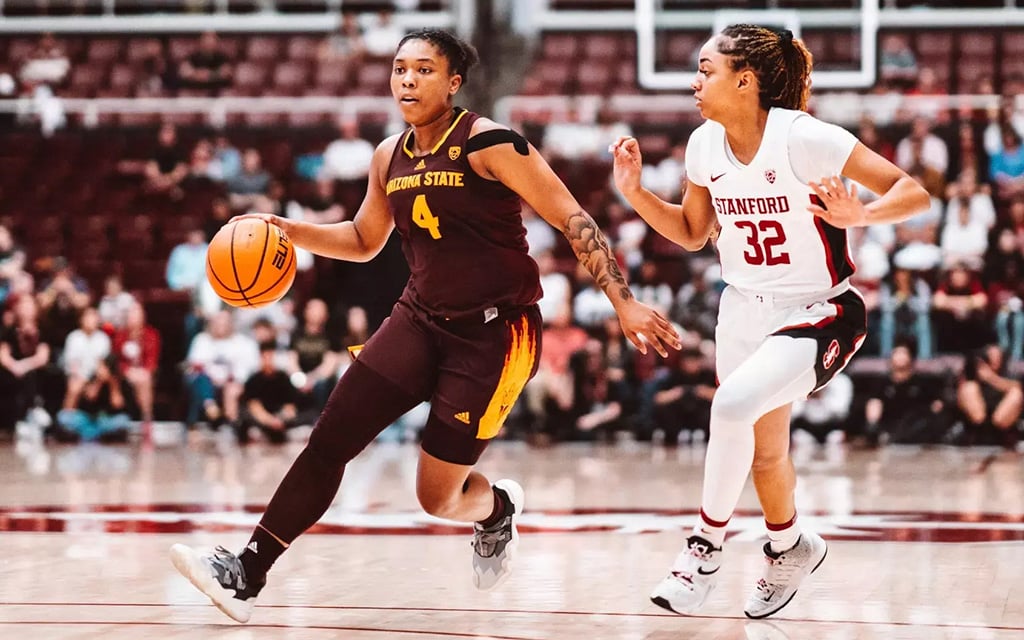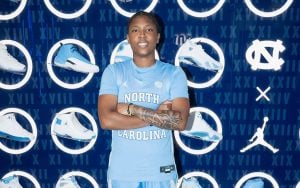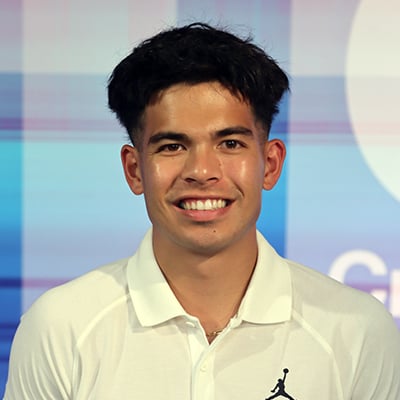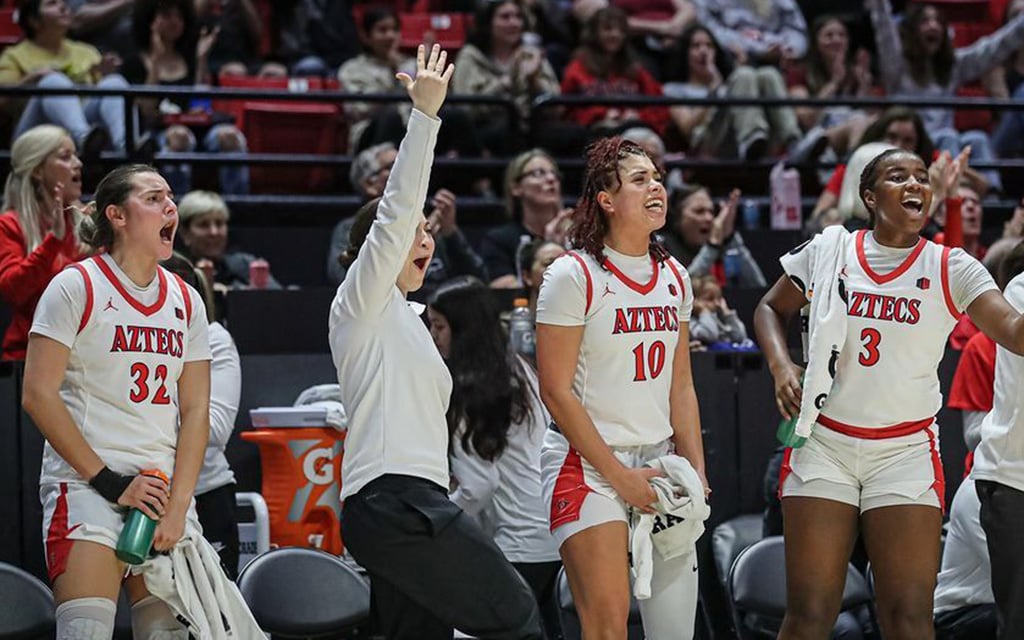PHOENIX – Grand Canyon University women’s basketball coach Molly Miller began the team’s first official practice week with what she calls “camp week.”
Monday was “Camp Go,” focusing on transition and conditioning. Tuesday was “Camp Bucket,” introducing Miller’s offensive system. Wednesday was “Camp Lockdown,” her favorite, centered on defense. And purposefully, the week ended with “Camp Grit,” emphasizing screening, taking charges, rebounding and trapping.
Rather than allowing the mental and physical weight of the high school-to-college transition to slowly creep up and “smack them in the face,” she said camp week is intentionally designed to do just that.
“This is a lot quicker and a lot stronger,” Miller said about the adjustment to the high school level. “They played high school ball at a level, and then we’re asking them to go up another couple levels, so there’s a transitional period.
“I think that initial introduction of the brand of camp week and showing them what this level and what we are all about is helpful.”
Away from home for many, and often for the first time, college freshman athletes face new routines, coaches, schedules, classes, travel and roommates.
On top of that, they are now competing at a level where everyone is the best from their area or, in some cases, the best in their state, with playing time now far from guaranteed.
Physically, it is a lot, and emotionally, it can be even harder.
“Nothing’s guaranteed when you get to that transition from high school to college,” said Eddie Perry, a sports psychologist with Grow Sports Psychology and Performance Improvement. “Going to a whole new school, trying to find a new support system, competing and battling for a spot against juniors and seniors, all on top of handling lifestyle changes. Your whole life changes once you get to the college level.”
But the faster college freshman athletes learn that the mental side is just as important as physical ability and skills, the transition becomes much less complex.
For San Diego State sophomore forward Mia Davis, North Carolina junior guard Trayanna Crisp, and Stanford freshman Shay Ijiwoye, doing so helped the three Valley natives adjust.
And while each journey is different, each transition – though far from seamless – reveals key foundations essential for making that jump.
Davis finds grace while remembering her path
Mia Davis’s sophomore year of high school at Xavier College Preparatory in Phoenix couldn’t have gone any better.
The top-ranked prospect in her class in Arizona, with interest from blue blood programs such as Stanford, Oregon and UConn, had just led Xavier to a 13-4 record and a 6A conference state playoff semifinal appearance.
Set to transfer to Dream City Christian in Glendale for the 2021-22 season to play her junior and senior seasons for her father, Prileu Davis, a summer basketball camp at Utah Tech University changed everything for her.
Davis tore her ACL on Aug. 6, 2021, and required an additional surgery in December, which extended her recovery time beyond expectations.
Returning to the court in July 2022, Davis played in just one tournament before tearing her other ACL in the last game of her next tournament for Russell Westbrook’s WhyNot EYBL team in Chicago.
To make matters worse, Davis tore her meniscus in May 2023, resulting in four surgeries and six injections before even arriving at San Diego State, where she committed on Nov. 9, 2022 as a four-star recruit.
“I definitely was discouraged,” Davis said. “I didn’t think I wanted to play anymore. Coaches were taking offers from me. I had envisioned my college career as one of the top players. I was just expecting that I would go to a big school and finally get to show my full potential. It was heartbreaking.”
In the back of her mind, Davis was thinking she might not want to play anymore.
That changed when San Diego State associate head coach Kellie Lewis called her about setting up a visit.

Mia Davis appeared in 25 games off the bench during her freshman year, averaging 3.7 points and 1.8 rebounds in 11.7 minutes per game. (Photo courtesy of Mia Davis)
“When I went to the school, I thought, ‘I’m going to just commit,’” Davis said. “I’m going to grind, persevere and go to college because it’s always been my dream. But physically, it has really had its ups and downs.”
The original plan was for Davis to redshirt her freshman season. However, head coach Stacie Terry-Hutson had other plans, telling her that she had been out long enough.
Still, in addition to dealing with everything that comes with being a freshman, it became difficult not to overthink each movement, creating an additional mental barrier.
Given all that Davis had been through, Terry-Hutson started holding weekly conversations with her to emphasize the importance of giving herself grace.
“I think for a lot of student-athletes, we have to remind them that they are still 17-18 years old,” said Eddie Perry, a sports psychologist with Grow Sports Psychology and Performance Improvement. “The reality is that when you get to that higher level, the expectations to perform are much higher due to pressure from fans, teammates, scholarships and coaches.”
Dave Dennis, a clinical therapist with the Grow Sports Psychology and Performance Improvement team, added, “They’re coming in from a place where they probably identified tremendously, if not almost exclusively, with their performance and sport in high school. It starts with having self-awareness of how things are shifting and how things are impacting them, which is sometimes hard for them to identify. But in a big way, addressing that starts with self-compassion and self-forgiveness.”
Davis’s first game in over two years came against Seattle University in Washington.
Having just gotten into the game and unable to contain her excitement knowing that her dad was in attendance, Davis found herself in help side in the paint. As she closed out, the player she had helped off of drilled a 3-pointer.
She couldn’t help but look to her father in the stands, where she saw him mouth the words, “It’s OK.”
At this moment, while it was certainly her welcome-to-college moment, Davis decided to give herself grace for what she felt was the first time in her career.
“I had dedicated my whole life to basketball,” Davis said about her first collegiate game. “There was really no other option. It was an intimate moment, playing in front of my little sisters, my dad, and my stepmom. My dad has always been my coach and trainer. He’s one of the biggest reasons I played basketball.
“My injury situations hit him too, so it’s a moment I’m never going to forget.”
While Davis admits she’s still working on giving herself grace and embracing her journey, she feels she is getting closer to the player she once was.
An 18-point performance in 21 minutes at Utah State on Jan. 21, during which she made five 3-pointers in the second half, spoke volumes about how important mental strength is.
“It’s a process and a journey,” Davis said. “It’s not gonna happen in one game or you’re not gonna just go out and be the best player in the world. I think that that performance showed me that I’m here for a reason and I’m still a top player. I just need to give myself that credit.”
Davis appeared in 25 games off the bench her freshman year, averaging 3.7 points and 1.8 rebounds in 11.7 minutes per game and won Mountain West Freshman of the Week in late January.
“Facing her challenges head-on have set her up not just for her to be a force on the court, but also in building resilience for the entire rest of her life,” Dennis said. “This same person is going to get knocked down again in some way, in some form and it’s so crucial she’s done this now because getting up again is going to be so much easier every single time.”
Why familiarity matters to Crisp

Trayanna Crisp, wearing her former ASU jersey, demonstrates why familiarity is vital for freshman athletes, as it helps them stay grounded and connected, even when it’s not within arm’s reach. (Photo courtesy of ASU Women’s Basketball)
Trayanna Crisp, the No. 73 overall prospect and a four-star recruit in the ESPN 2022 HoopGurlz recruiting rankings, entered college with a level of familiarity that many freshman athletes lack.
Committing to play in front of the hometown fans at Arizona State University in 2021 after being the focal point of three 5A state championships for Millennium High School in Goodyear, her twin sister, Bryanna, was right down the street, attending a local community college.
Crisp’s comfort showed on the court, as she handled the change in her role and the pace of the game fairly well. She appeared in all 28 games, starting seven, and finished fifth on the team in both scoring (5.1 points per game) and minutes (21.6 minutes per game).
As a sophomore, she improved further, becoming one of four Sun Devils to play in all 31 games (28 starts), finishing second in scoring (12.1 points per game), assists (2.1 assists per game) and steals (1.3 steals per game).
“It definitely helped a lot being home,” Crisp said. “There are some mental curves when entering college basketball. When you stay home, you’re familiar with the area and you have family and friends there, so it helped a lot with my transition.”
It was on April 8 that she encountered what most first-year players typically experience.
In a move she never anticipated, Crisp entered the transfer portal. She felt the need to be part of something bigger and, having never left Arizona her entire life, craved a change – a chance to experience more winning and something different.
For two or three weeks, she was in the portal, exploring different schools and feeling uncertain about what was next. When the University of North Carolina at Chapel Hill extended an offer, it boosted her self-esteem, as she had never thought of herself as “all that or a bag of chips.”
Aside from tournament games in the Bahamas and the Virgin Islands, she had never played a college game east of the Mississippi River.
“At ASU, I was able to go home,” Crisp said about what has been the toughest adjustment. “I was able to make friends there and had friends who I grew up with. Now, I’m far away from home and I’m unfamiliar with the area.”

Trayanna Crisp, the No. 73 overall prospect and a four-star recruit in ESPN’s 2022 HoopGurlz rankings, transferred from ASU to North Carolina this summer. The move wouldn’t have been possible without her twin sister, who provides her with a constant sense of home. (Photo courtesy of North Carolina Women’s Basketball)
Crisp already feels that building closer relationships with her teammates has aided her transition, but just southwest – about 10 miles away – lies the reason she considered transferring in the first place.
After not being admitted to UNC, Crisp’s twin Bryanna found a path to North Carolina Central University and enrolled.
“I couldn’t even describe what it means because it just means that much,” Crisp said about having her sister nearby. “I get to come home, talk about our days and grow our bond. Not often are siblings able to go to school in the same area, let alone the same state. It just makes me know that I do have a friend.
“My mom and dad aren’t here, but if all else fails, I have her.”
Adam Ratner, co-founder of Grow Sports Psychology and Performance Improvement, acknowledges that the close proximity Crisp shares with her sister is something many seek but aren’t as fortunate to have.
That’s why he believes it’s essential for college freshman athletes to surround themselves with some form of familiarity in any way possible, even if it’s not necessarily within arm’s reach.
“Familiarity equals a greater sense of safety and self,” Ratner said. “A greater sense of comfort where you might be able to be more vulnerable, you might be able to be more open and then you might feel more comfortable to reach out to coach or just be more receptive to feedback.
“Not feeling like you’re completely on an island makes you mentally that much stronger.”
Success on the court lies in finding passions beyond it for Ijiwoye
In the fourth grade, Shay Ijiwoye’s love for the game began while playing alongside one of her four brothers.
At that point, the Desert Vista High School graduate lost every game and cried after each one, but what she loved most – besides dominating on an all-boys team in fourth and fifth grade – was the opportunity to meet new people from various paths, stories and backgrounds.
Nine years later, after receiving scholarship offers from more than 45 Division I schools, the 2024 Gatorade Arizona Girls Basketball Player of the Year spent much of the summer in Palo Alto, California, adjusting to life at Stanford University as she prepared for her freshman year.
Fully immersed in her new journey, the intensity was a bit of a shock, but the biggest adjustment has been time management.
With the hope of “maximizing her time,” as she calls it, she’s juggling classes, homework, team practices, individual workouts, and advanced recovery methods to heal her body from the demands of basketball.
Upperclassmen have emphasized to the No. 53 overall prospect in the ESPN 2024 HoopGurlz Recruiting Rankings the importance of giving herself grace in managing this, especially with the lengthy season ahead.
The most significant piece of advice, which aligns perfectly with Ijiwoye’s personal motto – that her identity is not found “in her performance in the game” – has been to find moments to steer her mind away from basketball.
“Having other passions, because you do spend so much time playing your respective sport, allows one to take a step back,” sports psychologist Perry said. “Sometimes an athlete needs to go to different outlets to find the peace that they need because they put so much emphasis and pressure on sports. Sometimes, it can be as simple as taking one’s mind off it that proves beneficial.”
For Ijiwoye, this meant visiting Baker Beach in San Francisco, exploring food spots in the Bay Area, hosting her own basketball camp, playing pickleball and golf, and making quick trips abroad to Milan and Rome to indulge in gelato.
Most importantly, it centered around her top priority: reading the Bible and nurturing her faith.
“One thing in the Bible, it says to be a servant leader,” Ijiwoye said. “I just want that to really kind of emanate off me when people see or think of me. I’m just looking to serve the person next to me and being a freshman, just finding ways to help and letting that be my basis.
“I always will have a foundation to fall on or fall back to. My identity is not found in my performance in the game, rather, in Jesus Christ.”
Grand Canyon University coach Miller wholeheartedly agrees that it’s essential to find ways to take the mind off the game.
“Whether they’re coming over to my house to hang, whether we’re going to do community service in the community, whether we’re reaching out and doing a free little kids camp, all that’s important,” Miller said. “We’ve been given this platform and I think it’s a beautiful thing for our kids to understand and realize.
“Really putting themselves out in the community, making a difference and extending ourselves should be the holistic approach preached to all athletes.”

